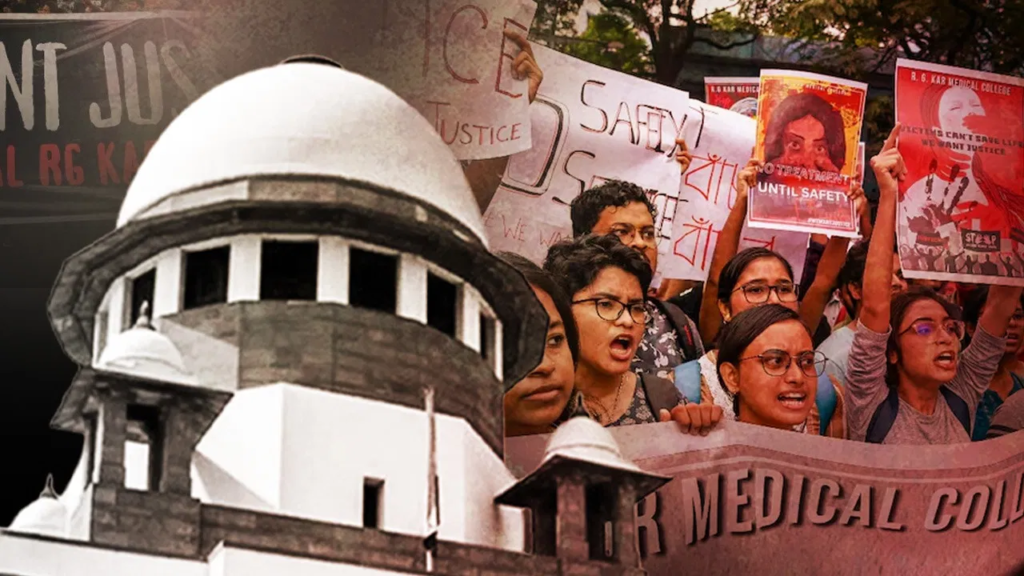Rehan Khan
On August 20, 2024, a Bench comprising Chief Justice of India DY Chandrachud, Justice JB Pardiwala, and Justice Manoj Misra issued several key directives in this suo motu case. The Court ordered the Central Bureau of Investigation (CBI) to submit a status report by August 22 on the progress of its investigation into the crime. The State of West Bengal was also directed to furnish a status report on the probe into the acts of vandalism that occurred in the hospital following the crime.
The Court expressed its deep concern over the failure of the West Bengal State machinery to prevent a large mob from vandalizing the emergency ward and other areas of the hospital on August 15. The Indian Medical Association (IMA) had called for a nationwide withdrawal of emergency services for 14 hours in response to the crime. The Court criticized the State for not deploying sufficient law enforcement to maintain order and protect the crime scene, stating, “We are unable to comprehend why the State could not do so.”
Formation and Composition of the National Task Force
The Supreme Court took the extraordinary step of forming the NTF to address the broader issues of the safety and well-being of medical professionals across India. The Task Force comprises the following members:
- Surgeon Vice Admiral R Sarin
- Dr. D Nageshwar Reddy
- Dr. M Shreenivas
- Dr. Pratima Murty
- Dr. Goverdhan Dutt Puri
- Dr. Saumitra Rawat
- Prof. Anita Saxena, Head of Cardiology, AIIMS Delhi
- Prof. Pallavi Sapre, Dean of Grant Medical College, Mumbai
- Dr. Padma Srivastava, Neurology Department, AIIMS
Ex-officio members include the Cabinet Secretary to the Government of India, the Home Secretary to the Government of India, the Secretary of the Union Health Ministry, the Chairperson of the National Medical Commission, and the President of the National Board of Examiners.
The NTF has been tasked with examining and recommending measures for the safety and well-being of medical professionals. The Court has ordered the NTF to prepare a national action plan within three weeks, with a final report due in two months. The action plan should focus on preventing gender-based violence and ensuring dignified working conditions for medical professionals, especially women.
Scope and Recommendations of the Task Force
The Court directed the NTF to address several critical issues, including:
- Enhancing security in emergency rooms.
- Implementing baggage screening to prevent weapons from entering hospital premises.
- Limiting access to hospital areas for non-patients.
- Improving crowd management and security protocols.
- Providing restrooms and gender-neutral spaces for medical staff.
- Installing biometric and facial recognition systems.
- Ensuring proper lighting and CCTV coverage in all hospital areas.
- Arranging transportation for medical professionals between 10 PM and 6 AM.
- Conducting workshops on handling grief and crisis situations.
- Conducting quarterly audits of institutional safety measures.
- Establishing police forces commensurate with the footfall at hospitals.
- Applying the POSH Act to medical establishments and constituting Internal Complaints Committees (ICCs).
- Setting up a helpline number for medical professionals in emergencies.
The Supreme Court was unequivocal in its criticism of the conditions faced by medical professionals, particularly women, in public hospitals. Chief Justice Chandrachud stated, “As more and more women join the workforce… the nation cannot wait for another rape for things to change on the ground.” The Court emphasized that protecting the safety of doctors, especially women, is of paramount national interest.
The Court also addressed the widespread attacks on medical professionals across the country, citing incidents in Bihar and Telangana as examples of the systemic failure to provide safe working conditions. The Bench noted that while several states have laws in place to protect medical professionals, these laws do not address the underlying institutional deficiencies.
The Supreme Court took a strong exception to the West Bengal government’s handling of the case, questioning the delay in filing the FIR and the State’s failure to protect the crime scene. Solicitor General Tushar Mehta highlighted that the vandalism by a mob of 7,000 people could not have occurred without the knowledge or connivance of the police. The Court also criticized the State for the mismanagement of the crime scene and the delay in taking appropriate actions.
In response to these failures, the Court urged all medical professionals to resume work, acknowledging that the ongoing strikes are affecting patients who need medical care. The Bench assured that the concerns of medical professionals are being addressed at the highest level.
Case title: In Re: Alleged Rape and Murder Incident of a Trainee Doctor in RG Kar Medical College and Hospital, Kolkata and Related Issues
Case no.: SMW(Crl) 02/2024)

